"My most recent analysis ... reveals a striking trend: A generation of conservative young priests is on the rise in the U.S. Church." - Fr. Andrew Greeley, in the article, "Young Fogeys", from The Atlantic Magazine. January, 2004.
Tuesday, December 26, 2006
Sunday, December 24, 2006
Saturday, December 23, 2006
B16 on Advent (part 4)
Part of the purpose of Advent within the Church year consists in reviving once more this awareness within us. It should urge us to confront these truths, to admit the extent of our lack of redemption, which did not simply exist in the world at some time and perhaps still exists somewhere but which is a present reality within ourselves and within the Church.
The Christian existence, therefore, includes this as well: that we, out of the distress of our own darkness, like the man Job, dare to speak to God. It also means that we do not think we could present to God only half of our existence and must spare him all the rest because it might grieve him. No - to him in particular we may and must carry the total burden of our existence in complete honesty."
Friday, December 22, 2006
Fiiiiive Gollllld Rinnnnngs
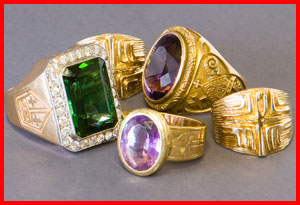
The rings above are episopal rings from the archives of the Archdiocese of Boston; rings that were worn, at one time or another, by Boston's Archbishops. The pic came from the blog of Boston's current Archbishop, Sean Cardinal O'Malley.
If you haven't seen it, Cardinal O'Malley's blog is called (brace yourself for the shock) cardinalseansblog. He was, as best as anyone can tell, the first member of the College of Cardinals to dive into the deep end of the New Evangelization and make use of the means of communication (blogs and Podcasts, for example) that are common today. Though it seems to be catching: The Archbishop of Sydney, George Cardinal Pell, has made his Christmas message available for downloading at the website for the Archdiocese of Sydney.
Anyway, while we're on rings, Cardinal O'Malley's blog the other day had some great close-ups of other rings:

This is the ring given to Cardinal O'Malley (and all the new Cardinals) by Pope Benedict XVI at the Consistory last March.
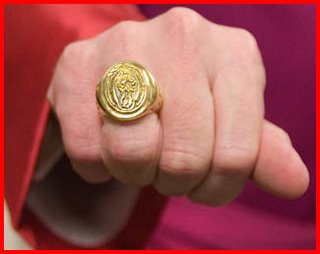
How's that for episcopal "bling-bling"?
Thursday, December 21, 2006
Coming In or Going Out?
Of course, thanks to Michael Deaver (master of President Reagan's public events), we know that the visual is worth more than the spoken words. If you take a look at the video, notice that the "priestess" is standing abut 5 yards from a set of double doors and a brightly-lit "Exit" sign.
So far from the Church; so close to the door...
Hail, Flora?
"Flora has never mated, or even mixed, with a male dragon, and fertilized all the eggs herself, a process culminating in parthenogenesis, or virgin birth. Other lizards do this, but scientists only recently found that Komodo dragons do too.
'Nobody in their wildest dreams expected this. But you have a female dragon on her own. She produces a clutch of eggs and those eggs turn out to be fertile. It is nature finding a way,' Kevin Buley of Chester Zoo in England said in an interview."
Well "Merry Christmas!" to all the skeptics who for years have been coming up with alternative theories about Mary's virginal conception. Santa finally brought you someone new to pick on!
I'm sure it won't be long before they start looking down at us "cultic, unenlightened, superstitious" types, and we start hearing that it couldn't possibly have happened that way; that some zookeeper probably snuck Flora into the boy-dragon's cage for the night (you know what they say: "What happens in the male Komodo Dragon pen, stays in the male Komodo Dragon pen!").
Flora, meanwhile, was unavailable for comment. She's gone in haste to visit her kinsdragon across town at the London Zoo.
Wednesday, December 20, 2006
More B16 on Advent: Waiting
 In this season of longer checkout lines and traffic backups, here's what Pope Benedict said about waiting during the season of Advent (again, these reflections I've been putting in are from "Co-Workers of the Truth: Meditations for Every Day of the Year", published by Ignatius Press):
In this season of longer checkout lines and traffic backups, here's what Pope Benedict said about waiting during the season of Advent (again, these reflections I've been putting in are from "Co-Workers of the Truth: Meditations for Every Day of the Year", published by Ignatius Press):"One of the fundamental elements of Advent is waiting, which at the same time is hoping. ... Jesus has illustrated [waiting and hoping] in many parables: in the story of the servants who wait for the return of their master or else, forget about his return and act as though they were the owners; in the tale about the virgins who are able or unable to wait for the groom; and in the parables of seedtime and harvest.
Man throughout his life is in a state of waiting; that man is in a state of waiting never becomes clearer than in times of illness. And in the same sense waiting becomes an unbearable burden when it remains entirely uncertain whether we may expect anything at all. And yet, if time itself contains a meaning, if each moment hides its specific quality and value, then the joyful expectation of greater things to come will make the present time even more precious and carry us, as if with invisible power, through all the moments of our time.
To offer us precisely this kind of waiting is the purpose of Advent; it represents the genuine Christian form of waiting and hoping. For the gifts of Jesus Christ do not merely reside in the future but indeed extend into the present. He, though hidden, dwells here already. He speaks to me in manifold ways - through Sacred Scripture, through the Church seasons, through the saints, through various events in everyday life, through all of creation, which takes on a different appearance when he is standing behind it ... I can talk to him; I can wail before him and offer him my sufferings, my impatience, my questions, knowing that he is lending me an open ear."
Monday, December 18, 2006
Ladies and Gentlemen, We Have Begun Our Initial Descent...

They're the words we can't wait to hear. When the captain comes over the loudspeaker and announces that that the flight attendants are coming to collect the garbage, and we should put our seats all the way up, lift the seat trays in the locked position, and buckle ourselves in. We're about to arrive at our destination.
Each year, on December 17th, our celebration of the Advent season takes a turn towards our final destination of Christmas. In this "Pre-Octave" (8 day) countdown, our focus shifts from the "joyful hope for the coming of our savior, Jesus Christ" a SECOND time, to remembering the last time He came to earth. This year it fell on a Sunday, and not just any Sunday: the third Sunday of Advent. The rose vestments made for a very visual transition into these late days of Advent that most people do not notice.
Picking up on the "collecting the garbage" theme, Sunday night I was asked to preach at a friend's Advent Penance Service at his parish. Like most places, he holds these things for both Advent and Lent, and it's always a good time to get together with a bunch of Priests both before and after the service. Don't think it's ONLY a good time: this is a parish that comes out in force to take out their spiritual trash in Confession (enough of a crowd that it took 15 priests over an hour to hear everyones' confessions).
So as the deadline of December 24th approaches, and maybe we've let the shopping and social "holiday season" get the best of us, now is the time to sit up straight, put the cookies aside (just for a moment), and prepare ourselves to honor the commemoration of the birth of Jesus Christ.
Friday, December 15, 2006
B16: In Your Face on Advent
 This is another reflection on Advent by Pope Benedict from Co-Workers of the Truth, a collection of then-Cardinal Ratzinger's homilies, newspaper articles, speeches, etc., that were compiled into a book of small daily meditations:
This is another reflection on Advent by Pope Benedict from Co-Workers of the Truth, a collection of then-Cardinal Ratzinger's homilies, newspaper articles, speeches, etc., that were compiled into a book of small daily meditations:"Let us ... gaze on John the Baptist. Challenging and active he stands before us, a ‘type’ of the manly vocation. In harsh terms he demands metanoia, a radical transformation of attitudes. Those who would be Christians must be ‘transformed’ ever again. ... Those who want to find God need, again and again, that inner conversion, that new direction.
And this applies to the total outlook on life. Day by day we encounter the world of visible things. It assaults us through billboards, broadcasts, traffic, and all the activities of daily life, to such an enormous extent that we are tempted to assume there is nothing else but this. Yet the truth is that what is invisible is greater and much more valuable than anything visible. One single soul, in Pascal’s beautiful words, is worth more than the entire visible universe.
But in order to have a living awareness of this, we need conversion, we need to turn around inside, as it were, to overcome the illusion of what is visible, and to develop the feeling, the ears and the eyes, for what is invisible. This has to be more important than anything that bombards us day after day with such exaggerated urgency.
Metanoeite: change your attitude, so that you may see God’s presence in the world - change your attitude, so that God may dwell in you and, through you, in the world. John himself was not spared this painful process of change, of turning around."
Thursday, December 14, 2006
Confessions: Quality or Quantity?
For Young Fogeys, Advent means hopping around to other parishes to be available to "bind and loose" at the communal penance services that are so prolific during the prequel to Christmas. Yesterday was one of those days (come to think of it, so is today; only I have a funeral first) when I supplied my sacerdotal services for Sacramental "binding and loosing". In the afternoon, I was at a Catholic high school across the river (in another county, state, and diocese) which some parishioners attend, and then in the evening I was at a parish not far from here (but far enough that I was "Father Stranger-Visitor", meaning I was a magnet for those who fear being recognized if they went to Confession to their Pastor, and love seeing an unfamiliar face in a Roman Collar).
In both places I was impressed by not only the quantity but the quality of the Confessions I heard. In the high school there were a steady stream of students for ninety minutes. Now having been a high school student, it would be easy to be cynical and say that they were only going to Confession to get out of class. But there was something about their Confessions that said that they were taking this as a serious unloading of sins, rather than an exercise in running the clock down before the dismissal bell. There was depth. There was introspection. There was a politeness and an understanding of the Priestly ministry being exercised in their midst (I believe there were about 20 Priests hearing Confessions in the school that afternoon). I left the school proud of these students I really didn't know, and especially proud of the school chaplain and faculty for the catechesis they're obviously giving the students. Later that night I went to the parish Advent penance service and experienced the same thing: depth in their exams of self and trust in the Sacrament to say their sins to a Priest honestly and without "packaging". Faith. I saw faith.
The Sacrament of Confession (or "Penance", or "Reconciliation", or whatever you want to call it) is, for me, the secret barometer on the spiritual health of a parish. Here's what I look for:
- Check the parish's bulletin. There should be as many opportunities for Confessions as there are Priests assigned to the parish. For example, a two-Priest parish should have at least 2 set times per week for scheduled Confessions. Also, what day of the week are confessions heard? Still only Saturdays? Saturday isn't the "free day" it was years ago when lines of penitents were plentiful. Now there's food shopping and kids' sporting events and other stuff that make finding the time to get to the church for confessions difficult. If a parish has a scheduled time for Confessions sometime on a weekday, I'm impressed. If it's a weekday evening, they get extra credit in my book.
- "...or by appointment." You see it in almost every parish bulletin. For example, St. Philintheblank's has scheduled Confessions on "Saturdays from 4 to 4:15pm, or by appointment". Confessing sins is embarrassing and humiliating; no one can get through to their Priest on the telephone without giving their name, and who wants to give their name and make an appointment to let out their dirty laundry? Don't get me wrong: The principle behind it of Priests being available to their people at a time when something has moved someone to unload their sins is great. I've had more than a few people actually call me and say, "Father, I'd like to go to Confession." Generally, though, "O-B-A" is a load of garbage. It's Father's way of not sitting in the box without feeling guilty. Bring a book, Father, and maybe a cushion for your chair.
- Penance services. I don't know how I feel about them. I know the Rite of Penance absolutely allows and encourages them. Pope Benedict, in fact, led a communal penance service this past Lent in St. Peters Basilica. But I fear that these communal services have caused a certain numbness towards the need to immediately confess any serious sins. Many people, children especially, are now so accustomed to these communal penance services that they simply do not know how to initiate a private confession ("Bless me, Father, for I have sinned. It has been ... Since my last confession"). I know these penance services mean they're going to Confession at least twice a year (assuming most parishes have these things during Advent and Lent), and that's not a bad thing at all. But these communal services, if not done well, can very easily degenerate into sloppy assembly lines more than opportunities for Sacramental Grace in an encounter with Christ the Divine Physician. Years ago I helped with confessions at a parish mission where the Priest giving the mission told the people, "When you come up, only tell the Priest one thing that keeps you from God." WHAT THE HELL DOES THAT MEAN? What if I was sitting at home feeling sweaty, then clammy, then nauseous, then short of breath, then with sharp pains in my left arm and chest? So I go to the emergency room and the doctor there says, "Don't tell me everything; Only give me ONE symptom"? So I tell him I'm sweaty, and he gives me a glass of orange juice and sits me off in a corner. You know what happens next: Twenty minutes later I'm floating above the ER and "heading towards the light"!
- Communal Penance Services are meant to be an embellishment in anticipation of the private Confession of sins that it's assumed will follow. But sometimes the symbol overtakes the substance, and we get so caught up in the Oprah-ness (mood lighting, soft music, and the "writing your sins down and burning them in the baptismal font") that the mind-boggling opportunity we, as Catholics, have to confess our sins and receive absolution is almost anti-climactic.
- General absolution. If you're on the battlefield or on a plane going down, then O.K., that's what it was meant for. But Priests who give it out like candy with a wink-wink to their flock (because there's such a large crowd and Father neglected to have a sufficient number of Priests available to hear everyone's confessions in a reasonable amount of time - in fact he invited no Priests, just like he did last time the parish had a penance service, and the time before that, and the time before that...) are not being pastoral. That's being lazy.
Yes, we can easily sit around and complain about what's wrong with things in the Church (and, believe me, Priests have this down to an art form). We can argue if Priests stopped being available for Confessions because people stopped going, or if people stopped going to Confession because the Priests stopped making themselves available (the ecclesial 'chicken or the egg'). Some measure success in quantity, while some argue that quality makes something better. But once in a while you get to see something that's well-done, like those 2 opportunities I had to hear Confessions, and you realize that when you've got both quality and quantity going on at the same time it's something special.
Saturday, December 09, 2006
Beware The Nose Police!!!
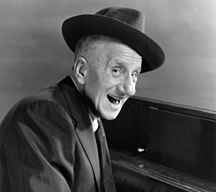 By now many of you have seen the story coming out of San Francisco about the "Got Milk" campaign which has "become a thing":
By now many of you have seen the story coming out of San Francisco about the "Got Milk" campaign which has "become a thing":These are snippets from an article in the SF Gate (for the whole article, click here):
"The novelty people were talking about Monday was the chocolate chip cookie scent placed in five bus shelters in the city as part of a m
 arketing campaign by the California milk industry to promote its product. The idea is that once people get a whiff of the cookie scent, they'll get a hankering for milk. The scene Monday around one of the bus shelters, at Stockton and Sutter streets, was a bit like listening to the chatter in a winery tasting room. 'Vanilla-y,'' one woman said as she walked past the shelter. ... The campaign has made news -- partly because it's the first of its kind in the nation, and
arketing campaign by the California milk industry to promote its product. The idea is that once people get a whiff of the cookie scent, they'll get a hankering for milk. The scene Monday around one of the bus shelters, at Stockton and Sutter streets, was a bit like listening to the chatter in a winery tasting room. 'Vanilla-y,'' one woman said as she walked past the shelter. ... The campaign has made news -- partly because it's the first of its kind in the nation, and  partly because this being San Francisco, there's controversy. Criticism has come from animal-rights advocates who oppose the dairy industry and from those against promoting food products when there's hunger in the world. ... Leading the charge against the campaign have been activists in the scent-sensitive community who are upset that public space is being invaded with another aroma that, they fear, can induce headaches and nausea and trigger asthma attacks."
partly because this being San Francisco, there's controversy. Criticism has come from animal-rights advocates who oppose the dairy industry and from those against promoting food products when there's hunger in the world. ... Leading the charge against the campaign have been activists in the scent-sensitive community who are upset that public space is being invaded with another aroma that, they fear, can induce headaches and nausea and trigger asthma attacks."Of course, once there's controversy and the media get involved, every group ("group" here being defined as anything ranging from a large lobbying organization with thousands on their mailing list, to one attention-needy person sitting in front of their computer with an internet connection and a press release written on some letterhead they got made at Kinkos) wants their 15 minutes of fame, and so groups claiming to represent the interests of diabetics, the homeless, and even the obese are also lodging complaints against the smell of chocolate chip cookies. So what's the result? Once again the "politically correct" crowd has triumphed, and the California Dairy Farmers Association must walk with their heads in shame for imposing their cookie scent on society.
Of course, Young Fogeys have long known about the existance of the "Nose Police." While we haven'
 t been dealing with chocolate chip cookies, the Church has long used incense in her liturgical worship. We are sensual people; we get our information through our senses, and incense not only gives us something to smell at Mass (something besides the mothball smell of the old lady next to you, or the 'just got out of soccer practice' of the kid on the other side), but the sight of the smoke rising is a visual reinforcement of Psalm 141:2 ("Let my prayer rise like incense before thee"), or the beautiful image of an angel's censer filled with incense to mingle with the prayers of the Saints in heaven (Rev 8:3-4).
t been dealing with chocolate chip cookies, the Church has long used incense in her liturgical worship. We are sensual people; we get our information through our senses, and incense not only gives us something to smell at Mass (something besides the mothball smell of the old lady next to you, or the 'just got out of soccer practice' of the kid on the other side), but the sight of the smoke rising is a visual reinforcement of Psalm 141:2 ("Let my prayer rise like incense before thee"), or the beautiful image of an angel's censer filled with incense to mingle with the prayers of the Saints in heaven (Rev 8:3-4). But we've all been through this: The moment you use incense at Mass, the Nose Police springs into action! They show their protest not with press releases, but with coughs. The coughs generally take 2 forms: First, there's the "pre-emptive strike" NP-ers. They actually begin their hacking when they see the thurible stand being put out in the sanctuary. Most NP-ers, however, fall into the "Shock and Awe" group: the ones who wait until a part of Mass that might involve the use of incense, and then from wherever they are in church (usually in the last row or so), their coughs break through the silence as if their lungs' well-being hang in the balance with every spoonful of incense used. These aren't the coughs of congestion, mind you, but coughs that are meant to say, "Why are you using that stuff? No other Priest in the parish uses incense! Don't you know there are starving children in China who could sell this incense in order to buy food? Don't you know that this will make Mass last longer by a whole 3 minutes, which means there'll be a line to get a seat at Denny's? Is this where my collection money goes? Don't you know my chihuahua was run over by a UPS truck delivering boxes of incense?"
But we've all been through this: The moment you use incense at Mass, the Nose Police springs into action! They show their protest not with press releases, but with coughs. The coughs generally take 2 forms: First, there's the "pre-emptive strike" NP-ers. They actually begin their hacking when they see the thurible stand being put out in the sanctuary. Most NP-ers, however, fall into the "Shock and Awe" group: the ones who wait until a part of Mass that might involve the use of incense, and then from wherever they are in church (usually in the last row or so), their coughs break through the silence as if their lungs' well-being hang in the balance with every spoonful of incense used. These aren't the coughs of congestion, mind you, but coughs that are meant to say, "Why are you using that stuff? No other Priest in the parish uses incense! Don't you know there are starving children in China who could sell this incense in order to buy food? Don't you know that this will make Mass last longer by a whole 3 minutes, which means there'll be a line to get a seat at Denny's? Is this where my collection money goes? Don't you know my chihuahua was run over by a UPS truck delivering boxes of incense?"In the end, the best response I can give to the Nose Police came from a Priest of my diocese: "There are 2 smells in the afterlife: incense and sulfur. Get used to one of them!"
Friday, December 08, 2006
Free Will and the Immaculate Conception
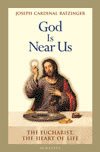 In a talk I recently gave to catechists for an Advent Mini-Retreat, I made use of a 1995 talk given by Pope Benedict at a Marian Congress. His talk was a reflection on the line in the Nicene Creed, "By the power of the Holy Spirit He was born of the Virgin Mary, and became Man". It's a line we recite every week (as well as Holy Days of Obligation, such as today), but can get lost as we go on 'auto pilot' when reciting things we've committed to memory. This talk is one of 13 essays, homilies, and other stuff found in God is Near Us, published by Ignatius Press about 3 years ago.
In a talk I recently gave to catechists for an Advent Mini-Retreat, I made use of a 1995 talk given by Pope Benedict at a Marian Congress. His talk was a reflection on the line in the Nicene Creed, "By the power of the Holy Spirit He was born of the Virgin Mary, and became Man". It's a line we recite every week (as well as Holy Days of Obligation, such as today), but can get lost as we go on 'auto pilot' when reciting things we've committed to memory. This talk is one of 13 essays, homilies, and other stuff found in God is Near Us, published by Ignatius Press about 3 years ago.In the "meat" of his address, Papa Ratzinger examines 3 passages from Scripture to see how they defend what we say in the Creed: The "annunciation" of God's plan to St. Joseph (found in Matthew 1:18-25), the prologue of John's Gospel (specifically how Jn1:14 "The Word was made flesh", blossoms in Jn 6:51 "The bread which I shall give for the life of the world is my flesh"), and Luke's account of the Annunciation (1:26-38). In that last reflection, he says this:
"Without the freely given assent of Mary, God cannot become man. Certainly, this 'Yes' Mary says is wholly by grace. The dogma of the Immaculate Conception of Mary, whereby she was freed from original sin, has in fact just exactly this as its sole significance: that no human being can set in motion the process of salvation by his own powers alone, but that his 'Yes' is wrapped around and supported within by that divine love which comes first and before all else and that already surrounds man before he is even born. 'All is grace.' Yet grace does not remove freedom; rather, it brings it into being. The entire mystery of redemption is present in this story and is summed up in the figure of the Virgin Mary: 'Behold, I am the handmaid of the Lord; let it be to me according to your word' (Lk 1:38)."
 God created each of us with free will. He could've created a 'clone army' who would've followed his orders perfectly and completely, but he didn't. He freely chose to create us in His image and likeness, and in doing so went beyond physical likeness to ontological likeness. He gave us human beings the ability to freely choose.
God created each of us with free will. He could've created a 'clone army' who would've followed his orders perfectly and completely, but he didn't. He freely chose to create us in His image and likeness, and in doing so went beyond physical likeness to ontological likeness. He gave us human beings the ability to freely choose.This gift of free will trickles down into all aspects of our life as Christians, especially in the Sacramental life of the Church: Every reception of a Sacrament requires some level of questioning on the part of the Church and acceptance on the part of receiver (eg - the couple giving their free consent at a marriage, parents being asked if they understand their newfound obligations when they ask to have their child baptized, even the "amen" at Holy Communion is the acceptance of the Church's teaching that the Communion Host about to be consumed is truly the Body of Christ). At every one of those moments we exercise our free will as given to us by God.
And things would have been all 'hunky-dorey', had not Original Sin entered the picture. Because of it, things like greed, pride, lust (and a bunch of other nastys) are now a part of our human nature. Mother Teresa takes her gift of free will and does tremendous good, while Adolf Hitler takes his free will and does tremendous evil. So rathe
 r than the perfectly-obeying clone army which certainly would have been easier for Him to manage, God has a bunch of "Mini Mes" on his hands: still in "His image and likeness", but seemingly always out to "get Him"! Put yourself into that dilemma: You like freshly squeezed orange juice so you go out and buy a juice machine, but when you get it home you find out the machine can't make orange juice. What would you do? You'd start all over and get a new machine, right? The amazing thing is that, even though salvation history is full of times when God said to do one thing and his people did another, He never created a "Humanity 2.0", without the burden of free will which we seemed to have such a problem with. Our Lady, born without the stain of Original Sin, could see things with a sharper perspective than we who were born with it. What it means is that Mary's big 'Yes' was given with an understanding of the past, present, and future that we have to continually struggle to achieve when we give our little "yesses" to God. Every day (several times a day, in fact) we have to reassert that "yes" to God, because (as many of us know so well), our "yes" in one moment can become a "no" in an embarrassingly, painfully short amount of time. Thank God, though, that he never gives up; never stops asking for our "yes". More than that, thank God that He goes so far as to tip the scales in our favor by giving us the advantage of Confession and the Eucharist, so that we can have at our disposal (albeit temporarily) what Mary had going for her (the Eucharist allows us to have Christ dwell within us and Confession removes sin and restores us to communion with God).
r than the perfectly-obeying clone army which certainly would have been easier for Him to manage, God has a bunch of "Mini Mes" on his hands: still in "His image and likeness", but seemingly always out to "get Him"! Put yourself into that dilemma: You like freshly squeezed orange juice so you go out and buy a juice machine, but when you get it home you find out the machine can't make orange juice. What would you do? You'd start all over and get a new machine, right? The amazing thing is that, even though salvation history is full of times when God said to do one thing and his people did another, He never created a "Humanity 2.0", without the burden of free will which we seemed to have such a problem with. Our Lady, born without the stain of Original Sin, could see things with a sharper perspective than we who were born with it. What it means is that Mary's big 'Yes' was given with an understanding of the past, present, and future that we have to continually struggle to achieve when we give our little "yesses" to God. Every day (several times a day, in fact) we have to reassert that "yes" to God, because (as many of us know so well), our "yes" in one moment can become a "no" in an embarrassingly, painfully short amount of time. Thank God, though, that he never gives up; never stops asking for our "yes". More than that, thank God that He goes so far as to tip the scales in our favor by giving us the advantage of Confession and the Eucharist, so that we can have at our disposal (albeit temporarily) what Mary had going for her (the Eucharist allows us to have Christ dwell within us and Confession removes sin and restores us to communion with God).Think of THAT next time that line in the Creed comes around!
Thursday, December 07, 2006
Feast of St. Ambrose
 Where do you begin to sing the praises of St. Ambrose?
Where do you begin to sing the praises of St. Ambrose?- Made it to the "final four" - the four great "Doctors of the Western Church" (so declared Pope Boniface VIII in 1298).
- Memorialized as one of the four Saints supporting the Altar of the Chair of Peter in GianLorenzo Bernini's bronze masterpiece in St. Peter's Basilica.
- The guy who tells St. Monica as she complained about her wayward son, Augustine, "Woman, you need to talk more to God about your son than to your son about God".
- The guy who would eventually baptize St. Augustine.
- The guy who puts the smackdown on the Roman Emperor, saying, "The Emperor is in the Church, not above it!"
- The bishop who wrote to his brother bishops, "He who reads much and understands much, receives his fill. He who is full, refreshes others. ... Therefore, let your words be rivers, clean and limpid, so that in your exhortations you may charm the ears of your people. And by the grace of your words win them over to follow your leadership. Let your sermons be full of understanding. ... Let no word escape your lips in vain or be uttered without depth of meaning."
- the homilies, the writings, even the little known "Ambrosian Rite of the Mass", and Ambrosian chant.
How do you pick?
I guess you don't "pick"; you just take a step back and appreciate.
Wednesday, December 06, 2006
Hello, Newman...
 Though this comes from John Henry Newman (1801-1890), it is technically not an Advent sermon, and so I didn't put "Newman on Advent" in the title. It is part of an anthology of Cardinal Newman's writings (he was created a Cardinal by Pope Leo XIII in 1879) called Selected Sermons, Prayers, and Devotions. In this day and age when homilies have become comedy routines, peppered with jokes and stories in an attempt to hold the ever-diminishing attention span of the pew-dweller, sermons like these are unthinkable at your average Sunday Mass at Saint Philintheblank's! This is from a sermon on the Incarnation of Christ:
Though this comes from John Henry Newman (1801-1890), it is technically not an Advent sermon, and so I didn't put "Newman on Advent" in the title. It is part of an anthology of Cardinal Newman's writings (he was created a Cardinal by Pope Leo XIII in 1879) called Selected Sermons, Prayers, and Devotions. In this day and age when homilies have become comedy routines, peppered with jokes and stories in an attempt to hold the ever-diminishing attention span of the pew-dweller, sermons like these are unthinkable at your average Sunday Mass at Saint Philintheblank's! This is from a sermon on the Incarnation of Christ:"Let us, then, according to the light given us, praise and bless Him in the Church below, whom Angels in heaven see and adore. ... He came in lowliness and want; born amid the tumults of a mixed and busy multitude, cast aside into the outhouse of a crowded inn, laid to His first rest among the brute cattle. ... Great is our Lord, and great is His power, Jesus the Son of God and Son of Man. Ten thousand times more dazzling bright than the highest Archangel, is our Lord and Christ."
Tuesday, December 05, 2006
St. Josemaria Escriva on Advent
 From a homily he gave during Advent of 1951, which can be found in Christ is Passing By, a book of St. Josemaria's homilies given throughout the Church's liturgical year:
From a homily he gave during Advent of 1951, which can be found in Christ is Passing By, a book of St. Josemaria's homilies given throughout the Church's liturgical year:"I don't wish to go on any longer on this first Sunday of Advent, when we begin to count the days separating us from the birth of the Savior. ... You see within yourselves, on the one hand, pride, sensuality, boredom, and selfishness; on the other [hand], love, commitment, mercy, humility, sacrifice, joy. You have to choose. You have been called to a life of faith, hope, and charity. You cannot seek lesser goals, condemning yourself to a life of mediocre isolation. Some time ago I saw an eagle shut up in an iron cage. It was dirty, and half its feathers were missing. In its claws was a piece of carrion. I then thought what would happen to me were I to renounce my vocation from God. I felt sorry for that lonely, fettered bird, born to soar the heavens and gaze at the sun. We too can scale the 'humble heights' of love for God, of service to all men. However, in order to do this, we must make sure that our souls have no nooks or crannies into which the light of Jesus Christ cannot shine. And then Christ will be in your mind, on your lips, in your heart, stamped on your deeds. All of your life will be full of God - in its sentiments, its works, its thoughts and its words.
'Look up, and lift up your heads, because your redemption is at hand,' we have just read in the Gospel. This time of Advent is a time for hope. These great horizons of our Christian vocation, this unity of life built on the presence of God our Father, can and ought to be a daily reality.
Ask our Lady, along with me, to make it come true. Try to imagine how she spent these months, waiting for her Son to be born. And our Lady, Holy Mary, will make of you alter Christus, ipse Christus: another Christ, Christ himself!"

St. Josemaria Escriva moved to Rome as Opus Dei grew. You can visit his tomb in Opus Dei's prelatic Church (technically, Opus Dei is not a Religious Order, but a "personal prelature" of the Pope), Our Lady of Peace, under the main altar (pictured left). For information about the visiting hours, times confession is available, and a map, click here.
Monday, December 04, 2006
St. Charles Borromeo on Advent
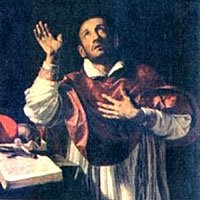 From a pastoral letter by St. Charles Borromeo (which was in this morning's Office of Readings in the Liturgy of the Hours):
From a pastoral letter by St. Charles Borromeo (which was in this morning's Office of Readings in the Liturgy of the Hours):"Beloved, now is the acceptable time spoken of by the Spirit, the day of salvation, peace, and reconciliation: the great season of Advent. ... Each year, as the Church recalls this mystery, she urges us to renew the memory of the great love God has shown us. This holy season teaches us that Christ's coming was not only for the benefit of his contemporaries; his power has still to be communicated to us all. We shall share his power, if, through holy faith and the sacraments, we willingly accept the grace Christ earned for us, and live by that grace and in obedience to Christ. The Church asks us to understand that Christ, who came once in the flesh, is prepared to come again. When we remove all obstacles to his presence he will come, at any hour and moment, to dwell spiritually in our hearts, bringing with him the riches of his grace."
 Speaking of Borromeo, one of the neat churches in Rome is the Basilica of Sts Ambrose and Charles on the Corso. The "Charles" in the church's title is for Borromeo, and the church has his heart in a reliquary behind the main altar. What I think is most excellent about this parish, though, is their commitment to evangelization and catechetics. At the entrance of the Basilica is a wall of racks (the "pamphlet" kind, not the "torture" kind), holding very well-done booklets in 5 languages about what the Catholic Church teaches on various topics. The parish has put them online, and you can check them out for yourself, or print them for others, by clicking here.
Speaking of Borromeo, one of the neat churches in Rome is the Basilica of Sts Ambrose and Charles on the Corso. The "Charles" in the church's title is for Borromeo, and the church has his heart in a reliquary behind the main altar. What I think is most excellent about this parish, though, is their commitment to evangelization and catechetics. At the entrance of the Basilica is a wall of racks (the "pamphlet" kind, not the "torture" kind), holding very well-done booklets in 5 languages about what the Catholic Church teaches on various topics. The parish has put them online, and you can check them out for yourself, or print them for others, by clicking here.
Sunday, December 03, 2006
OF/YF Test #1
B16 on Advent
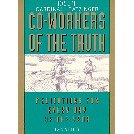 Back in 1992, Ignatius Press published a book of daily meditations by then-Cardinal Joseph Ratzinger, called Co-Workers of the Truth (his episcopal motto). Though the meditations are his, they are a collection of fragments from articles, essays, etc., the Cardinal had written over the years and weren't specifically written for the book. I think it's a great primer for those who want to sample his writings, yet feel a little intimidated to read Pope Benedict's stuff (C'mon, we've all had that dream plenty of times: You get to page four and with a big, "huh?", drop the book, run out the door screaming and swearing never to touch a Ratzinger book again. What, just me?). These meditations are great samplings of his style and depth (remember, he's a theology professor by training, so don't look for fluff), it's arranged around the liturgical seasons of the Church (so you get Lent meditations at Lent, Easter at Easter, etc.), and are, more or less, one page in length. Don't fear, Scarlett; if you don't understand today's entry, tomorrow's another day.
Back in 1992, Ignatius Press published a book of daily meditations by then-Cardinal Joseph Ratzinger, called Co-Workers of the Truth (his episcopal motto). Though the meditations are his, they are a collection of fragments from articles, essays, etc., the Cardinal had written over the years and weren't specifically written for the book. I think it's a great primer for those who want to sample his writings, yet feel a little intimidated to read Pope Benedict's stuff (C'mon, we've all had that dream plenty of times: You get to page four and with a big, "huh?", drop the book, run out the door screaming and swearing never to touch a Ratzinger book again. What, just me?). These meditations are great samplings of his style and depth (remember, he's a theology professor by training, so don't look for fluff), it's arranged around the liturgical seasons of the Church (so you get Lent meditations at Lent, Easter at Easter, etc.), and are, more or less, one page in length. Don't fear, Scarlett; if you don't understand today's entry, tomorrow's another day.In the book there are about 10 meditations on Advent, and I'm thinking that, over the course of this month, I might include some of them in my blog for your daily perusal. Here's one appropriate for the start of Advent:
"'Advent' is a Latin word that can be rendered in English as 'presence, arrival.' In the language of the ancient world it was a technical term expressing the arrival of an official, especially the arrival of kings or emperors in the province. ... The Christians adopted this term to proclaim their special relationship to Jesus Christ. For them, he is a King who entered this wretched province, our world, and gifted it with the feast of his visit. ... He has not abandoned this world. He has not left us behind alone. Even though we cannot see and touch him like so many things - he is present, nevertheless, and visits us in many ways. Advent is a twofold reminder for us: for one, that God's presence in the world has already begun, that he, in hidden ways, is already here; and then, that his presence has only just begun and not yet reached completion but is still growing, developing, maturing. His presence has already begun, and we, the believers, are the ones through whom he desires to be present in the
world. Through our faith, hope, and love he desires to shine his light ever anew into the night of the world. The lights we kindle during the dark nights of this wintertime are therefore both a consolation and a reminder:
the consoling assurance the 'the Light of the world' has already appeared in the darkness of the night in Bethlehem and has changed the unholy night of human sin into the holy night of divine forgiveness for this sin."
Saturday, December 02, 2006
Four More Years... Four More Years...
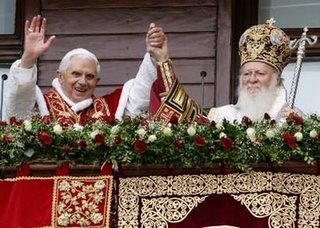
I apologize for being so silent on Pope Benedict's trip to Turkey. I had every good intention of watching the events as they were covered on EWTN, and then downloading the transcripts of the homilies and speeches in order to come up with something to say about the trip. Unfortunately, that just didn't happen.
But thanks to the blogosphere, some people did put very fine words to paper (well, to computer screen actually), and this is one of them.
Father Z has a blog called "What Does The Prayer Really Say" in which, besides commentary, he shows the literal translations of the prayers at Mass as they are written in the official Latin (and how the English translations of the 1970s fall pathetically short). He has made some very worthwhile points in his commentary on the address of Ecumenical Patriarch Bartholomew of Constantinople at the end of the Divine Liturgy which Pope Benedict attended. Check out Fr. Z's commentary and see if the photo above gives us a hint as to who has become the most unlikely of co-conspirators in Papa Ratzinger's reform of the Roman Liturgy.


